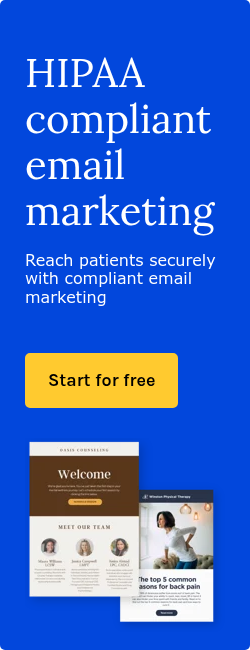
Healthcare providers increasingly rely on email marketing to communicate with patients. However, striking the right balance between providing valuable information and respecting patient privacy is critical for fostering trust and nurturing long-lasting relationships.
Ethical healthcare email marketing principles
Start by laying a strong ethical foundation for your email marketing. Upholding these principles ensures a positive experience for your patients.
Seek permission:
Request consent to send emails, ensuring respect for privacy. Use double opt-in methods to confirm the subscription. This builds trust and prevents unsolicited emails.
Be transparent:
Clearly communicate data usage and privacy policies in plain language so patients know how their information is handled. Transparency fosters trust and demonstrates your commitment to protecting patient data.
Personalize:
Tailor content to individual needs, preferences, and concerns, making each email more relevant and valuable to the recipient. Personalization improves engagement and shows you understand their unique needs.
Best practices for ethical healthcare email marketing
Incorporate these best practices to maintain high ethical standards and promote a positive patient experience.
Stay HIPAA compliant:
Safeguard sensitive health information by following HIPAA guidelines and regularly training staff on compliance. Compliance is crucial for protecting patient privacy and avoiding legal penalties.
Related: HIPAA compliant email marketing
Handle data securely:
Use robust security measures like encryption and secure servers to protect patient data from unauthorized access. Secure data handling demonstrates your commitment to patient privacy.
Offer control:
Provide easy-to-find opt-in and opt-out options, allowing subscribers to manage their email preferences. Empowering patients with control enhances trust and satisfaction.
Crafting meaningful content
Deliver value in every email by focusing on informative, relevant, and helpful content that resonates with your patients.
Inform and educate:
Share valuable health tips, updates, and resources to empower patients in managing their health. Educated patients are likelier to make informed decisions and engage in proactive healthcare.
Highlight benefits:
Showcase how your services improve patient outcomes, using testimonials or success stories to illustrate their impact. Demonstrating benefits helps patients understand the value of your services and can encourage utilization.
Be resourceful:
Include links to helpful tools, articles, and support resources that enhance patients' understanding and decision-making. Offering additional resources showcases your expertise and commitment to patient wellbeing.
Metrics to measure success
Track and evaluate the performance of your email campaigns to continually refine and improve your strategy.
Track engagement:
Monitor open and click-through rates to gauge interest and identify areas for improvement. Understanding engagement levels helps you optimize content and timing for better results.
Seek feedback:
Encourage patient responses via surveys or direct replies and implement changes based on their input. Feedback enables you to address concerns and continuously improve your email campaigns.
Prioritize quality:
Focus on nurturing meaningful connections with patients rather than solely increasing subscriber numbers. Quality connections lead to stronger patient relationships and better healthcare outcomes.
Building trust through consistency
Establish a reliable and recognizable email presence to strengthen relationships and cultivate trust with your patients.
Set a schedule:
Establish a regular communication cadence, balancing frequency with value to stay top-of-mind without overwhelming patients. Consistency keeps patients informed and engaged with your practice.
Maintain identity:
Keep a consistent brand voice and visual style across all emails to create a cohesive, recognizable presence. A strong brand identity enhances patient trust and loyalty.
Be responsive:
Promptly address patient inquiries and feedback, showing you care about their concerns and experiences. Prompt responses demonstrate your commitment to patient satisfaction and foster trust.
Adopting these ethical healthcare email marketing practices can enhance patient engagement and build lasting, trust-based relationships that contribute to better health outcomes.
Subscribe to Paubox Weekly
Every Friday we'll bring you the most important news from Paubox. Our aim is to make you smarter, faster.

 Dean Levitt
Dean Levitt



